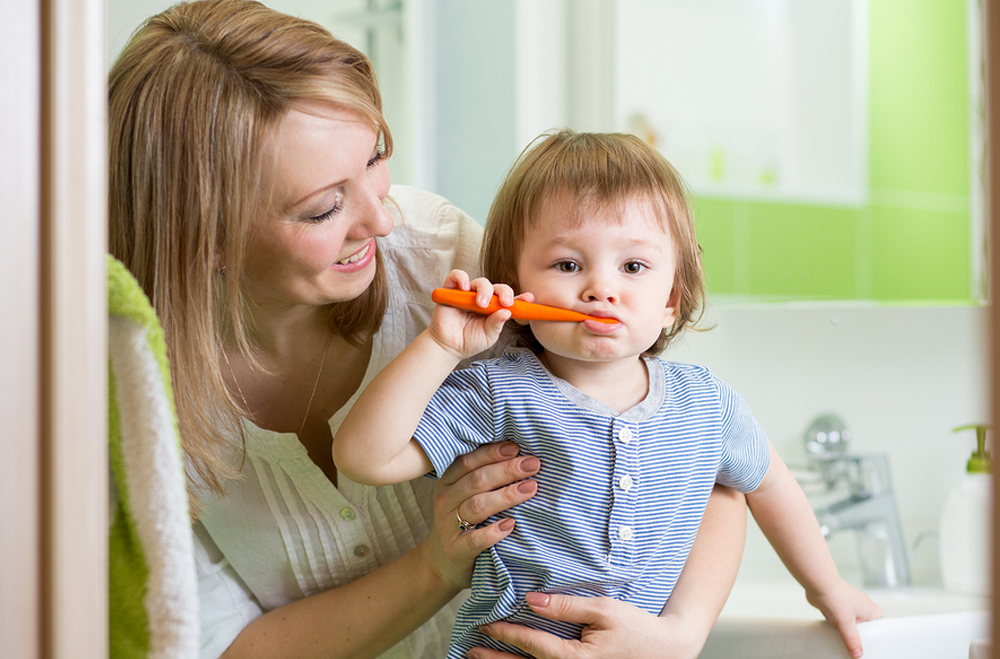Good oral hygiene is essential when it comes to preventing cavities and other dental diseases and the regime should start when children are young. Dr Divya Bhargava of Smile Inc. Dental Surgeons in Singapore shares essential tips to ensuring that your little one establishes proper oral hygiene and has good dental health right from the get-go.
Mummyfique: When should I start caring for the dental care for my child?
Dr Divya Bhargava: It starts right from when they start feeding. After every feed, use a wet soft wash cloth or a damp piece of gauze to clean the gums and tongue.
It’s also important to avoid extra sweet and sticky food in their diet as this increases the chance of tooth decay when their teeth erupt.
How early should I start brushing your child’s teeth and what should I use ?
As soon as the first tooth starts erupting in the mouth, I recommend using a small soft toothbrush to clean the tooth. Once adjacent teeth come out, mouth flossing is necessary to prevent decay in between the teeth.
Use fluoride-free toothpaste for a child under two or until the child is able to not swallow tooth paste. For flossing, floss holders are easy to use or you can use any waxed dental floss.
How should I brush an older child’s teeth and how do I teach them to brush their own teeth?
Always use an age appropriate soft toothbrush. For children aged two- to five-years-old, the American Academy of Paediatric Dentistry recommends using a pea-sized amount of fluoride toothpaste. Fluoride is very important in its role to prevent tooth decay.
Stand behind your child in front of a mirror, and cup his/her chin in your hand, with his/her head leaning on you. Use a soft brush and angle the bristles to the gum, and move the brush in a round and circular motion from the gum to the top of the teeth.
Next, efficiently brush the insides, outsides and tops of the teeth in an up-and-down motion to stimulate the gums. When you are done, use the brush to clean the tongue and then floss their teeth.
By watching you brush their teeth repeatedly, children will slowly but surely learn to brush and floss on their own.
You can also request for the dentist to go over the brushing and flossing technique with you child when you make a visit.
How often should I bring my child to the dentist?
The American Academy of Paediatric Dentistry recommends making the first visit to the dentist anytime between the ages of six- and 12-months, before your child’s first birthday.
Thereafter, you should take your child to the dentist every six months to prevent cavities and other dental problems. Cleaning and fluoride treatment will be done as required, not necessarily with every visit.
If you see any black spots or discolouration on your child’s teeth, you should take him/her to the dentist immediately.
What bad habits lead to the poor development for a child’s teeth?
- Swallowing fluoride toothpaste can cause fluorosis in the permanent teeth, where there is discolouration and sometimes pitting (cracks) in the tooth surface.
- Pencil chewing introduces bacteria into the oral cavity and can cause wear of the tooth surface.
- Nail biting increases the risk of bruxism (grinding of teeth) in children, and can cause pain and sensitivity to the child.
- Frequent snacking of sugary, sticky and acidic foods in between meals can increase the risk of tooth decay.
- Prolonged use of sippy cups during the day or the milk bottle at night will expose the teeth to excessive sugar and acidic beverages, and this may damage the tooth enamel.
- Thumb or any finger sucking and the use of pacifiers can result in the misalignment of teeth and problems in the development a child’s jaw.
What are some mistakes parents make when caring for their child’s teeth?
- Not supervising their children brushing their teeth. This should be done diligently until the child is old enough to take ownership of the task.
- Not going for regular six-month dental check-ups.
- Allowing the child to snack frequently on sugary and sticky food, and acidic beverages in between meals.
- Not asking their child to rinse after eating.
Dr Divya Bhargava is a dental surgeon at Smile Inc. Dental Surgeons and a member of the American Academy of Cosmetic Dentistry.















